Trump Admin Fires Key Science Advisors
Air Date: Week of May 12, 2017
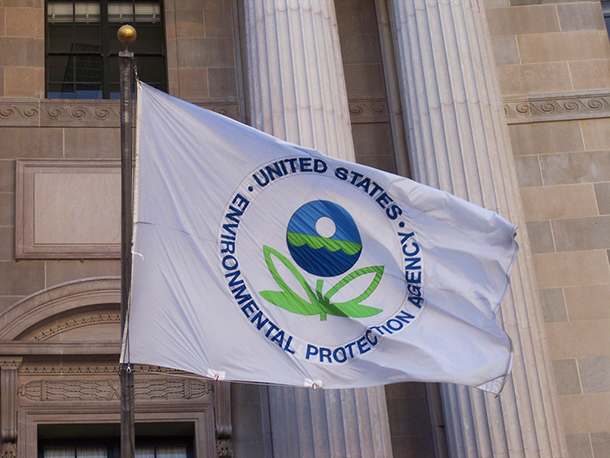
The Environmental Protection Agency flag flies at the agency's headquarters in Washington, D.C. (Photo: Paul A. Fagan, Flickr CC BY-NC-ND 2.0)
In a departure from standard practice, the Environmental Protection Agency has not renewed the terms of half of the members of a scientific review board. Ken Kimmell, President of the Union of Concerned Scientists, discusses with host Steve Curwood why this latest move is just one of several actions the Trump administration has taken to diminish the role of scientific research at EPA and elsewhere in the federal government. They also discuss why world leaders are anxiously awaiting the Trump administration’s decision about the U.S involvement in the Paris Agreement.
Transcript
[THEME]
CURWOOD: From PRI, and the Jennifer and Ted Stanley Studios at the University of Massachusetts Boston, this is Living on Earth. I’m Steve Curwood. Donald Trump is notorious for saying, “You’re fired,” most recently to the head of the FBI in the middle of its probe of Mr. Trump’s suspected financial and campaign ties to Russia. In a less famous but still striking move, the Trump Administration also recently cashiered nine of 18 scientists serving on the Board of Scientific Counselors at the EPA, saying industry needed more representation. And published reports say the Interior Department is suspending the work of 200 advisory boards, calling the future of those panels into question.
Ken Kimmell is the President of the Union of Concerned Scientists. Ken, welcome back to Living on Earth.
KIMMELL: Thank you. It's a pleasure to be with you again.
CURWOOD: So, tell me first how important is the EPA's Board of Scientific Counselors an,d what's it tasked with doing?
KIMMELL: It's a board of experts in various fields, and they serve as a very important strategic resource to EPA to help and answer the question, “Are we doing the right science? Is the work we're doing really protecting the American public as best as we can, and are we using our scarce taxpayer dollars in the most effective way?” And the board is intended to give EPA advice at a very high level about how to conduct the best governmental science it can.
CURWOOD: And what do we know about the nine scientists who were dismissed from this Board of Scientific Counselors at the EPA?
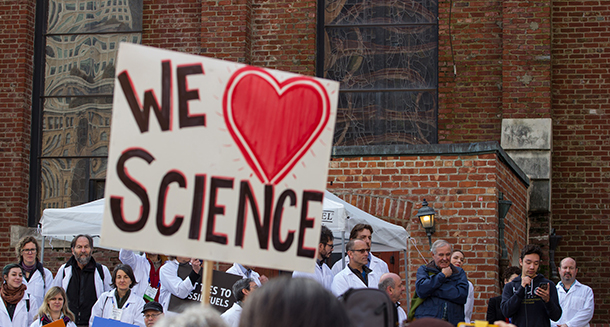
Scientists and allies rallied outside the American Geophysical Union’s annual conference in December of last year, calling on the major convening of climate scientists to “Stand Up for Science”. (Photo: Peg Hunter, Flickr CC BY-NC 2.0)
KIMMELL: They are academic experts and some industry and governmental officials as well, representing a variety of scientific fields that all intersect with the work that EPA does. There's an expert in environmental economics, which is such an important field. There's experts in sociology because part of what EPA needs to do as a regulatory body is not just make rules, but make sure that people understand and accept them, and the community is brought in. There are members of this board who are climate experts. Some are experts in toxicology, which is all about the threats that different pollutants have on public health a,nd disciplines of that nature.
CURWOOD: So, Ken, to what extent is this dismissal within the normal scope of action for a new administration?
KIMMELL: Well, it's really not. Typically these board members stay on or two terms, at least six years. Part of the reason of that is, of course, you want to take advantage of their institutional expertise. Now, these nine members who were turned away had just finished their first term. As a matter of course they would've been renewed for a second term. In fact, they were told that they were going to be, and now very abruptly they've all been asked not to return, and part of the reason why the Union of Concerned Scientists is flagging this is because we think that this is really a part of a much bigger story. This is not an isolated action. It's connected to a lot of other things that the Trump administration is doing that really show, “A,” a lack of respect for science and experts, but, even worse, an effort to get them out of the way of an agenda which is to cut protections that all of us rely upon that come from the federal government.
CURWOOD: What actions are you thinking of?
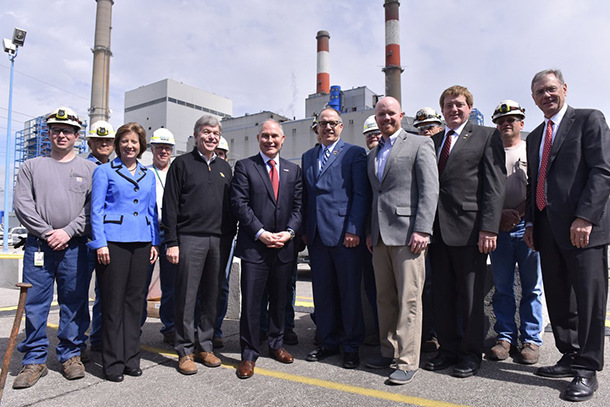
EPA Administrator Scott Pruitt visiting a coal plant in Missouri April 20th. (Photo: U.S. EPA Twitter, CC government work)
KIMMELL: Well, there are so many. I'll start with EPA and Scott Pruitt, who has a position on climate change that's directly contrary to what his own EPA scientists say on the website about the role of carbon dioxide. One of his first official acts in government was to decide not to ban a pesticide that his own experts had told him posed a significant public health and safety risk. We have a proposed budget that has deep and unprecedented cuts to the agencies and government that do science, like EPA or the Department of Energy or NOAA or NASA. And we have bills that are being supported by the administration that would make it much more difficult, for example, for academic scientists to participate in government and make it easier for industry to participate.
I'm kind of reminded of the phrase of Dick the Butcher in Henry XI when he was plotting an insurrection and said, "First thing we do when we get into power, let's kill all the lawyers." Well, I think the Trump administration, their agenda is, "Let's fire the scientists." If we lose the independence of our government scientists, we really lose a critical bulwark in making sure the government works for people and not just for industry interests.
CURWOOD: Now, a spokesman for the EPA administrator Scott Pruitt has said he's thinking about replacing these scientists with industry scientists -- academics with industry, I gather -- since they, and I quote here, "understand the impact of regulations on the regulated community". Now, I understand there are some industry scientists already on the board, am I correct?
Robert Richardson, one of the dismissed scientists, tweeted about the termination of his tenure on the board.
Today, I was Trumped. I have had the pleasure of serving on the EPA Board of Scientific Counselors, and my appointment was terminated today.
— Robert Richardson (@ecotrope) May 5, 2017
KIMMELL: There are industry scientists on the board, and there's also several people who have been involved in government at the state and local level.
CURWOOD: So, in your view, what's the optimal balance of industry and academia on the EPA science advisory boards?
KIMMELL: Well, first of all, I want to take issue with this idea of industry scientists and academic scientists. The criteria for picking advisory scientists should be their scientific excellence: How well they know this field, what their contributions have been to it, what their ability is to give excellent scientific advice to EPA. Whether they come from industry or academia or elsewhere is very secondary. And in particular, for this board we're talking about, this board doesn't even review EPA regulations. That’s a different scientific board that does that. This board is about giving advice to EPA about how to conduct the best possible science, and while there's no harm in having members of that board have an industry background, it really isn't, and shouldn't be, the criteria for membership on this board.
CURWOOD: Ken, what do you make of the failure of the Trump administration so far to appoint a science adviser to the President himself, someone right there in the White House that he can go and talk to if he has questions about science?
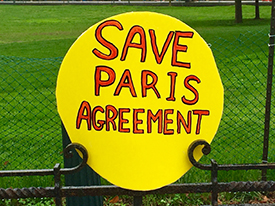
At the March for Science in Washington, D.C. on Earth Day 2017, marchers expressed support for the U.S. remaining in the Paris Agreement. (Photo: Becker1999, Flickr CC BY 2.0)
KIMMELL: Well, that's another example of a lack of respect for the role that science should be playing. Other presidents have had science advisors right in the White House. They have been important experts that have been routinely consulted on matters with a wide range of issues, and not to have someone with those scientific credentials in the White House is a problem particularly because we have a president who by his own admission has said he doesn't typically read much and doesn't get into the details of things.
CURWOOD: Ken, the Trump administration, as we speak, is still talking about whether not to keep the US in the Paris climate agreement. What do you anticipate the administration will do about Paris?
KIMMELL: Well, it's really unknown. As you are no doubt aware there appears to be a division within the administration about whether to stay in the agreement or not. He is of a general mindset that doing things to deal with the climate is inevitably bad for the economy. I think that is completely false, and all you have to do, really, is look at the hundreds and hundreds of thousands of jobs that are being created in the solar and the wind and the energy efficiency industries to see just how wrong that is. I do think that world leaders are contacting the White House and calling upon the White House to make the decision to stay in the agreement. Notably, many business leaders are doing the same thing.
I will say this though. It would be a travesty if we leave this agreement. We fought for decades to have an agreement that every country was involved in, not just the developed countries like ours, but the developing countries like China and India. We finally got that after decades of work. It's only been in effect now for a year, and the idea that we would pull out before even giving it a chance is incredibly distressing. It really risks making us a pariah nation. The only other two countries that aren't in this agreement are Syria and Nicaragua. Even North Korea is in this agreement.
CURWOOD: Now, toward the end of this month, Ken, the G7 meets, and Mr. Trump will meet with these leaders for the first time, really, as a group. And a big question there will be for him: What are you going to do about Paris? How do you think the G7's going to go?
KIMMELL: Well, I think that he has committed to giving them an answer to that question. Frankly, I think, if the answer is that the United States is going to pull out, he should expect that the G7 will have a very strong backlash. I also think that this is a president who is going to need these countries for cooperation on a lot of things, not just on climate, on trade, on fighting terrorism. And he really risks rupturing that relationship by pulling out of this agreement and creating the impression that when the United States gives its word, as we did when we signed that agreement, that it can't be counted on.
And that is a tremendous problem here that needs to get factored in.
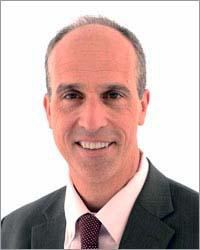
Ken Kimmell is President of the Union of Concerned Scientists (Photo: Union of Concerned Scientists)
CURWOOD: Before you go, Ken, to what extent are other countries stepping up to take the lead in the wake of US, and you could even say the EU is stepping back a bit from climate leadership?
KIMMELL: Well, I think so far countries have reacted well in the sense that they're going forward. They're doing all the things they need to implement the Paris agreement. None of them have said, "Well, if the US pulls out, we're going to pull out also." So, that's very, very good.
I think another thing that's very good is, we have states and cities and business leaders who are making it clear that they are determined to do whatever they can to make sure that the US does actually meet its commitments under Paris. And that's really important because it's not just up to the federal government. It's up to all of us and in particular states and cities and businesses to make up difference. And I do think that if we pull out of Paris you can expect that we will still have some representation through those groups of leaders. And I think it's important for the world to understand that Mr. Trump may have one view about the Paris agreement, but most people in the United States by wide margins think that the agreement was the right thing to do, and we should say in it.
CURWOOD: Ken Kimmell is the president of the Union of Concerned Scientists. Thanks so much for taking the time with us today.
KIMMELL: Thank you, Steve.
CURWOOD: We asked the EPA for comment on the change of personnel at the Board of Scientific Counselors. The agency’s spokesperson J.P. Freire, wrote:
"Advisory panels like BOSC play a critical role reviewing the agency’s work. EPA received hundreds of nominations to serve on the board, and we want to ensure fair consideration of all the nominees, including those nominated who may have previously served on the panel and carry out a competitive nomination process."
Links
EPA information about the Board of Scientific Counselors
NYTimes: “E.P.A. Dismisses Members of Major Scientific Review Board”
E&E News: “Interior: Agency suspends advisory panels even as decisions loom”
Letter from over 200 global investors urging G7 to stand by Paris Agreement
CNN: “Trump administration delays Paris climate agreement decision”
Scientists from a BOSC subcommittee resigned following their colleagues' dismissal
Living on Earth wants to hear from you!
Living on Earth
62 Calef Highway, Suite 212
Lee, NH 03861
Telephone: 617-287-4121
E-mail: comments@loe.org
Newsletter [Click here]
Donate to Living on Earth!
Living on Earth is an independent media program and relies entirely on contributions from listeners and institutions supporting public service. Please donate now to preserve an independent environmental voice.
NewsletterLiving on Earth offers a weekly delivery of the show's rundown to your mailbox. Sign up for our newsletter today!
 Sailors For The Sea: Be the change you want to sea.
Sailors For The Sea: Be the change you want to sea.
 The Grantham Foundation for the Protection of the Environment: Committed to protecting and improving the health of the global environment.
The Grantham Foundation for the Protection of the Environment: Committed to protecting and improving the health of the global environment.
 Contribute to Living on Earth and receive, as our gift to you, an archival print of one of Mark Seth Lender's extraordinary wildlife photographs. Follow the link to see Mark's current collection of photographs.
Contribute to Living on Earth and receive, as our gift to you, an archival print of one of Mark Seth Lender's extraordinary wildlife photographs. Follow the link to see Mark's current collection of photographs.
 Buy a signed copy of Mark Seth Lender's book Smeagull the Seagull & support Living on Earth
Buy a signed copy of Mark Seth Lender's book Smeagull the Seagull & support Living on Earth

